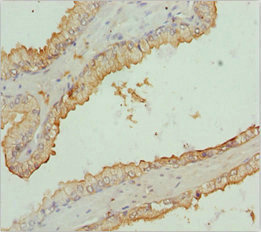
Immunohistochemistry of paraffin-embedded human prostate cancer using CSB-PA856886ESR2HU at dilution of 1:100
RNF34 Antibody

CSB-PA856886ESR2HU
ApplicationsELISA, ImmunoHistoChemistry
Product group Antibodies
ReactivityHuman
TargetRNF34
Overview
- SupplierCusabio
- Product NameRNF34 Antibody
- Delivery Days Customer20
- ApplicationsELISA, ImmunoHistoChemistry
- CertificationResearch Use Only
- ClonalityPolyclonal
- ConjugateUnconjugated
- Gene ID80196
- Target nameRNF34
- Target descriptionring finger protein 34
- Target synonymsCARP1; CARP-1; caspase regulator CARP1; caspases-8 and -10-associated RING finger protein 1; E3 ubiquitin-protein ligase RNF34; FYVE-RING finger protein MOMO; hRFI; human RING finger homologous to inhibitor of apoptosis protein; RFI; RIF; RIFF; ring finger protein 34, E3 ubiquitin protein ligase; RING finger protein RIFF; RING-type E3 ubiquitin transferase RNF34
- HostRabbit
- IsotypeIgG
- Protein IDQ969K3
- Protein NameE3 ubiquitin-protein ligase RNF34
- Scientific DescriptionE3 ubiquitin-protein ligase that regulates several biological processes through the ubiquitin-mediated proteasomal degradation of various target proteins. Ubiquitinates the caspases CASP8 and CASP10, promoting their proteasomal degradation, to negatively regulate cell death downstream of death domain receptors in the extrinsic pathway of apoptosis (PubMed:15069192). May mediate \\\Lys-48\\\-linked polyubiquitination of RIPK1 and its subsequent proteasomal degradation thereby indirectly regulating the tumor necrosis factor-mediated signaling pathway (Ref.13). Negatively regulates p53/TP53 through its direct ubiquitination and targeting to proteasomal degradation (PubMed:17121812). Indirectly, may also negatively regulate p53/TP53 through ubiquitination and degradation of SFN (PubMed:18382127). Mediates PPARGC1A proteasomal degradation probably through ubiquitination thereby indirectly regulating the metabolism of brown fat cells (PubMed:22064484). Possibly involved in innate immunity, through \\\Lys-48\\\-linked polyubiquitination of NOD1 and its subsequent proteasomal degradation (PubMed:25012219).
- ReactivityHuman
- Storage Instruction-20°C or -80°C
- UNSPSC12352203
